Palmini Pasta has carved out a niche for itself in the health food industry, offering a unique alternative to traditional pasta. After its appearance on the reality TV show “Shark Tank”, where entrepreneurs pitch their businesses to investors, Palmini has continued to thrive and expand. The company, founded by Alfonso Tejada, was initially valued at around $ 1.2 million during its Shark Tank pitch and has since seen significant growth.
Today, Palmini boasts a diverse product line that includes angel hair pasta, lasagna, and linguine. Made from hearts of palm, this low-carb pasta substitute is not only a best-seller on Amazon but also generates revenue of $ 1 million per year.
Despite initial concerns about its distinct taste and early sales figures, Palmini has managed to secure its place in the market, demonstrating the potential success of innovative health-conscious food products. This article will delve into the journey of Palmini Pasta after Shark Tank, exploring its growth, challenges, and current status.
What Is Palmini Pasta?
Palmini stands as a pasta replacement derived from the heart of palm trees. These palm hearts, exclusively present in palm trees, serve as the core ingredient. This alternative is entirely free from chemicals, embracing a completely natural composition while also offering a substantial dose of dietary fiber.
Conveniently available in cans or pouches, these plant-based pasta substitutes are ready for your culinary adventure. With a quick rinse and your favorite spaghetti sauce, you can transform Palmini into a delightful meal. This pasta alternative caters to those seeking a neutral flavor profile and a texture reminiscent of traditional pasta.
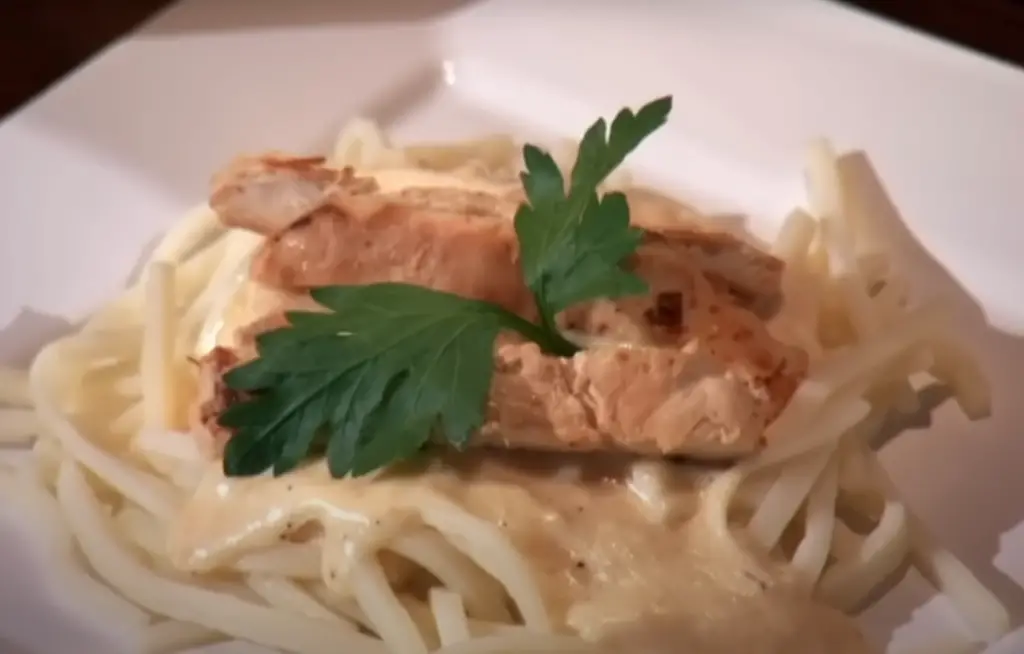
Pros:
- Low in Calories and Carbs: One of the greatest advantages of Palmini Pasta is its low-calorie and low-carb content. This makes it an excellent choice for those following a keto diet or anyone trying to reduce their carbohydrate intake;
- Gluten-Free: Palmini Pasta is made from hearts of palm, making it naturally gluten-free. This is great news for people with celiac disease or those who are sensitive to gluten;
- High in Fiber: Palmini Pasta is a good source of fiber which can aid in digestion and help you feel full longer, potentially aiding in weight loss;
- Easy to Prepare: Palmini Pasta comes pre-cooked, so all you need to do is rinse it, heat it up, and it’s ready to serve. This makes it a convenient option for quick meals;
Cons:
- Taste and Texture: While Palmini does a decent job mimicking the texture of traditional pasta, it’s not perfect. Some people may find the taste slightly metallic or bitter, and the texture a bit crunchier than regular pasta;
- Price: Compared to regular pasta, Palmini Pasta is more expensive. This could be a deterrent for some people, especially if they consume pasta frequently;
- Availability: While it’s becoming more popular, Palmini Pasta is not as readily available as traditional pasta. You might have to go to specialty stores or order it online;
Who Should Eat Palmini Products?
What’s not to love about this delectable choice? Palmini is a gluten-free, GMO-free delight, and remarkably low in calories. Moreover, it seamlessly integrates into a keto-friendly and sugar-free dietary regimen, boasting a composition consisting of 90% water [2].
Registered dietitian Amy Keating, RD, highlighted the nutritional benefits of Palmini, stating that it’s an excellent way to increase vegetable consumption in a diet where most Americans fall short in their daily vegetable intake. While there have been concerns about the sustainability of the product, Palmini asserts that its hearts of palm are sourced from Ecuador and cultivated in an eco-friendly manner that allows the plants to regrow and be harvested repeatedly, ensuring sustainability.
Moreover, the company’s aluminum cans are recyclable, appealing to eco-conscious consumers seeking more environmentally friendly packaging options.
With Palmini, you can indulge in your passion for pasta while also making a conscious choice for better health and maintaining an optimal weight. It’s the ideal solution for those seeking a harmonious blend of flavor and well-being.
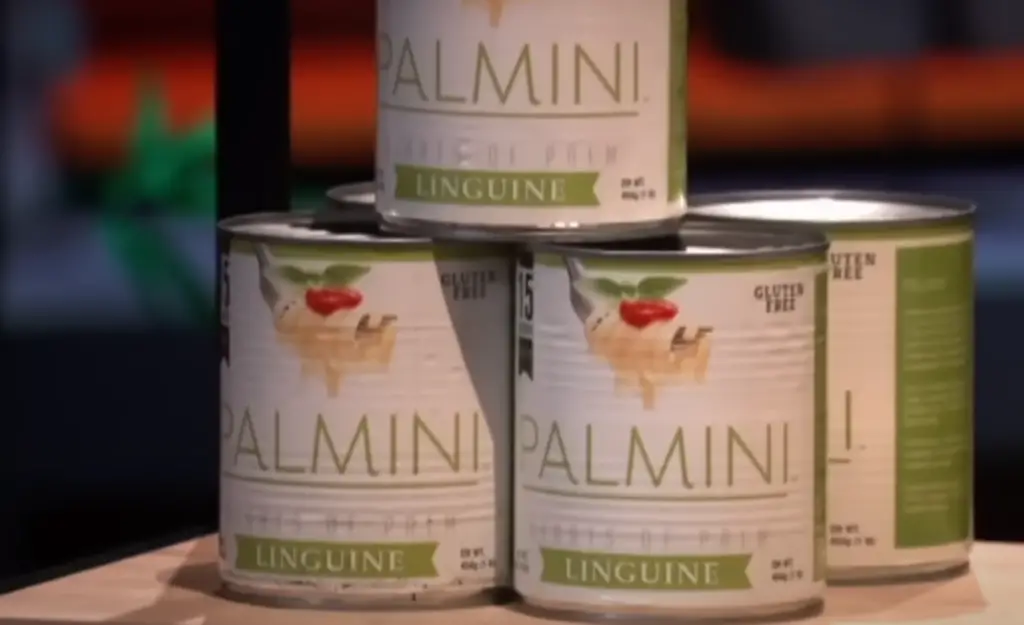
About the Founders Of Palmini Pasta
Palmini is the brainchild of OA Foods, a company founded by Alfonso Tejada [3]. OA Foods not only offers Palmini but also imports quinoa from Bolivia, which happens to be Tejada’s home country. Following his graduation from the University of Florida’s business school, Tejada returned to Bolivia to engage in his family’s business. It was during this period that he recognized the accessibility of quinoa and subsequently established OA Foods in 2012.
Tejada’s journey took a crucial turn when he perceived a growing demand for healthier pasta alternatives. Inspired by the concept of using Heart of Palm as a pasta substitute, akin to zucchini noodles, he sought guidance from a cousin who owned a Heart of palm factory in Bolivia. Collaboratively, over the course of two years, they dedicated themselves to perfecting a specialized machine capable of transforming hearts of palm into pasta-like noodles.
Finally, in 2017, OA Foods unveiled Palmini to the world as a low-carb pasta alternative, marking the culmination of Tejada’s vision and dedication to creating a healthier pasta option [4].
The Pitch Of Palmini Pasta At Shark Tank
The Sharks are absolutely enamored with the presentation and can hardly wait to sample Palmini Pasta. Mark playfully quips about Alfonso bringing along a vacuum cleaner, injecting some humor into the conversation. Alfonso has meticulously prepared three Palmini dishes to tantalize the Sharks’ taste buds, each paired with distinct sauces and flavors. First up is a slightly spicy pasta salad with shrimp, boasting a mere 200 calories per generous serving. Robert, however, candidly admits that it doesn’t quite suit his palate.
The second offering features a delectable combination of parmesan and garlic, while the third dish showcases the classic pairing of spaghetti with marinara and meatballs. Lori expresses her appreciation for the Palmini pasta, particularly because of her fondness for hearts of palm.
She initially believed Alfonso was transforming hearts of palm into a powdered noodle form, but she soon learned that Palmini is, in fact, a vegetable crafted from hearts of palm. Alfonso reveals the challenges he faced during the two-year development process, including the creation of a specialized machine, which is currently pending patent approval. However, there’s a pressing concern: Palmini doesn’t quite replicate the taste of traditional pasta.

Lori and Bethenny, both enthusiasts of hearts of palm, find Palmini to their liking. In contrast, the male Sharks discern a difference. Mark, an avid pasta lover, enjoys it but admits to a slight sense of disappointment. Alfonso points out that he often experiences bloating after consuming traditional pasta. He emphasizes that Palmini, being 90% water, theoretically allows for guilt-free pasta consumption.
However, Bethenny raises a valid point – alternatives like spiralized zucchini or whole hearts of palm are readily available. She had assumed Palmini was akin to quinoa pasta or spinach pasta.
Lori acknowledges that Palmini is an innovative product, considering its vegetable origin. Amidst the Sharks’ overlapping comments, Mark raises another crucial question – what sets Palmini apart from pasta? Lori inquires about Alfonso’s background, and he shares his journey from business school and graduating Summa Cum Laude at the University of Florida to working in his family’s business in Bolivia, where he had early access to quinoa before it gained popularity in the United States.
Bethenny points out that Palmini essentially consists of shredded hearts of palm, and the only proprietary aspect is the machinery used in its production. She raises concerns about potential competitors replicating the process once perfected. Alfonso explains that developing the cutting machine took two years, and they currently have a pending patent for it. Bethenny remains unconvinced, highlighting the challenge of safeguarding the proprietary process against larger competitors.
Lori interjects, emphasizing her regular consumption of hearts of palm and commending the uniformity of Palmini noodles. Bethenny presses on, questioning how Alfonso plans to defend his market share against potential giants. Alfonso’s response, expressing hope that one of the Sharks can help, doesn’t satisfy Bethenny.
Bethenny, dissatisfied with the answers, expresses her admiration for Alfonso’s passion and suggests he explore the alternative food space, potentially even venturing into other products like carrot pasta. However, she believes that once the process is perfected, competitors could easily replicate it, leading her to be the first Shark to bow out of the deal.
Alfonso’s valuation of the company at $ 3.5 million raises eyebrows, and Daymond doesn’t see any major food processors hesitating to enter the market once Palmini gains popularity. Consequently, Daymond opts out of the deal as well. Lori and Mark confer privately while Robert seizes the opportunity to express his decision.
Robert, an avid pasta lover himself, expresses reservations about vegetable substitutes for pasta. He, too, is out of the deal. Alfonso remains resolute, believing that Palmini could become synonymous with pasta just as Splenda is to sugar. He sees vast potential but Robert disagrees. Lori, however, is effusive in her praise for Palmini, particularly its low-calorie count and fat content, with no added sugar. She eagerly offers to partner with Alfonso to take Palmini to new heights. Mark, also smitten with the product, joins Lori in the offer.
The road ahead promises hard work, as the Sharks will seek a larger equity stake. Alfonso acknowledges the need to address packaging issues, and due to the dual partnership, the offer stands at $ 300,000 for 30% equity. This adjustment effectively reduces Alfonso’s valuation to a third. Mark contends that paying to play is a necessary step in business, while Lori underscores that there are no shortcuts to success in the business world – everyone must take the stairs. With two Sharks on board, it’s an express elevator to the top.

In response, Alfonso counters with an offer of $ 300,000 for 18%, which he later amends to 20% equity. Lori suggests $ 300,000 for 25% as the lowest equity they can accept. After a brief moment of contemplation, Alfonso accepts the offer, securing a $ 300,000 investment for 25% equity [6].
He is now partnered with Lori and Mark, poised to take Palmini to new heights.
Palmini Pasta After The Shark Tank
As of 2023, you can easily get your hands on Palmini through the OA-Foods website store, and for the convenience of Amazon shoppers, they are also available on Amazon [7]. Notably, Palmini has secured its place as one of the best-selling items in Amazon.com’s pasta category, a testament to its growing popularity.
In the four months following its television appearance, Palmini has expanded its presence to select Whole Foods, Albertsons, and Kroger stores, making it more accessible to a wider audience.
Palmini continues to thrive, expanding its product range to include angel hair pasta, lasagna, and linguine, offering even more options for consumers. Additionally, the brand has ventured into creating other low-carb products based on hearts of palm, such as a rice substitute and a mashed potato alternative. These products are available in both pouches and cans, catering to the convenience of shoppers.
Furthermore, under the parent company O.A. Foods, Palmini has introduced products like quinoa, chia, and llajua sauce under the Greenfit brand. These offerings can also be found on the Palmini company website.
Palmini actively engages with its community through social media, particularly on Facebook, where they share regular updates. While their Facebook following currently stands at 6,000 followers, it’s worth noting that their product page boasts an impressive 4.5-star rating based on 35 different reviews.
It appears that once people experience the Palmini way, it becomes challenging to revert to traditional pasta. Notably, Palmini has garnered a devoted following among vegans and individuals following a Keto diet, highlighting its appeal to health-conscious consumers.
The Net Worth Of Palmini Pasta
Palmini experienced a whirlwind of success within a single day after appearing on Shark Tank. They achieved a remarkable feat by completely selling out on Amazon, their largest distributor. Just four months later, their sales surged in retail stores such as Whole Foods, Albertsons, and Kroger.
The show also brought calls from retail giants Walmart and Wegmans, marking a significant turning point for the company. What began as a business centered around quinoa products now boasts a valuation of $ 1.2 million following their Shark Tank deal.

Over the course of two years, Palmini’s revenue skyrocketed from $ 10,000 to an impressive $ 100,000. Since its appearance on Shark Tank, the company has been on an upward trajectory, expanding its product range, introducing new flavors, and launching a direct-to-consumer website.
Palmini has garnered investments from various sources, paving the way for its expansion into major retailers like Whole Foods and Walmart. As of January 2023, Palmini remains a thriving business, continuing to grow and make its mark in the market.
The company initially began with a focus on its own quinoa and chia product lines, but its primary ingredient has evolved into Heart of Palm, leading to the creation of the Palmini product line. The benefits of Palmini include being GMO-free, gluten-free, and sugar-free, with a low-calorie count ranging from 15 to 20 calories per serving and a high water content of 90%. It has gained popularity as a keto diet-friendly product and is packaged in an eco-friendly manner.
Palmini expanded its offerings to include a range of pasta made from the Heart of Palm and later introduced products in the form of rice and mashed potato substitutes.
Alternatives To Palmini Pasta
If you’re looking for alternatives to Palmini Pasta, several options are available to suit various dietary preferences and needs.
Here are some alternatives:
- Zucchini Noodles (Zoodles): Zucchini noodles are a popular low-carb and gluten-free alternative to traditional pasta. You can create zoodles using a spiralizer or julienne peeler. They have a mild flavor and work well with a variety of sauces;
- Spaghetti Squash: When cooked, the flesh of spaghetti squash naturally forms noodle-like strands. It’s a nutritious and low-calorie alternative that pairs nicely with marinara, pesto, or other pasta sauces;
- Shirataki Noodles: Shirataki noodles are made from konjac yam and are very low in calories and carbohydrates. They are a suitable option for those on low-carb or keto diets. Be sure to rinse them thoroughly before use;
- Cauliflower Rice: While not a direct pasta replacement, cauliflower rice is a versatile and low-carb option for dishes like stir-fries or as a base for various sauces;
- Bean-Based Pasta: There are pasta alternatives made from beans, such as black bean, chickpea, and lentil pasta. These options offer higher protein and fiber content than traditional pasta;
- Kelp Noodles: Kelp noodles are made from seaweed and are gluten-free and low in calories. They have a unique texture and work well in cold salads and Asian-inspired dishes;
- Spiralized Sweet Potatoes: Sweet potato noodles can add a touch of sweetness and vibrant color to your meals. They are a good source of vitamins and minerals;
- Cabbage Leaves: For a low-carb alternative in dishes like cabbage rolls, you can use softened cabbage leaves instead of pasta;
- Riced Broccoli: Similar to cauliflower rice, riced broccoli is a cruciferous vegetable option that can be used as a base for sauces or stir-fries;
- Gluten-Free Pasta: If you’re specifically seeking gluten-free pasta, there are numerous options available on the market made from rice, quinoa, corn, or legume flours;
- Eggplant Slices: Eggplant can be sliced and used as a pasta substitute in dishes like eggplant lasagna;
- Soba Noodles: Soba noodles, made from buckwheat flour, are a gluten-free option for those who enjoy Asian-inspired dishes;

Choose the alternative that aligns best with your dietary preferences and the specific dish you’re preparing to enjoy a satisfying pasta substitute.
FAQ:
- Who else invested in Palmini?
Mark Cuban and Lori Greiner from the popular TV show Shark Tank invested in Palmini. They offered $ 300,000 for a 25% equity stake in the company.
- Are Palmini noodles healthy?
Yes, Palmini noodles are considered healthy because they are low in calories, high in fiber, and are a good low-carb alternative to traditional pasta.
- What does Palmini pasta taste like?
The taste of Palmini pasta can be slightly metallic or bitter to some people. It is often described as having a similar but not identical flavor to hearts of palm [10].
- Can diabetics eat Palmini noodles?
Yes, Palmini noodles are a good option for diabetics due to their low carbohydrate content4.
- Is Palmini pasta vegan?
Yes, Palmini pasta is vegan as it is made from the heart of palm, a type of vegetable.
- Is Palmini organic?
Yes, Palmini is organic. It is made from the Heart of Palm that has been organically grown.
- What is Palmini made of?
Palmini is made from hearts of palm, which is a type of vegetable.
- Is Palmini keto-friendly?
Yes, Palmini pasta is keto-friendly due to its low-carb content.
- How much fiber is in Palmini?
A serving of Palmini contains about 2 grams of fiber.
- Is Palmini gluten-free?
Yes, Palmini is gluten-free making it a good option for those with gluten intolerance or celiac disease.
- Is Palmini Whole30 approved?
Yes, Palmini is Whole30 compliant. It is made from a single ingredient – hearts of palm, which is allowed on the Whole30 diet.
- Can you eat Palmini raw?
Palmini comes pre-cooked so it can be eaten straight from the package, although it’s recommended to rinse and heat before serving.
- Is Palmini dairy-free?
Yes, Palmini is dairy-free.
- Why do you soak Palmini in milk?
Soaking Palmini in milk helps to neutralize the natural acidity of the product and make it taste more like traditional pasta.

- What can I substitute Palmini with?
You can substitute Palmini with other low-carb pasta alternatives such as zucchini noodles (zoodles), spaghetti squash, or shirataki noodles.
- What pasta does not raise blood sugar?
Low-carb pasta alternatives like Palmini, zucchini noodles, and shirataki noodles are less likely to raise blood sugar levels.
- Does Aldi sell Palmini?
Availability at Aldi may vary by location. It’s best to check with your local store or on their website.
- How many calories are in Palmini pasta?
A serving of Palmini pasta contains about 20-30 calories.
- What is Palmini linguine?
Palmini linguine is a version of Palmini pasta cut into the shape of linguine, a type of pasta similar to fettuccine.
Useful Video: Could Palmini Replace Pasta?
References:
- https://www.mashed.com/1057563/heres-what-happened-to-palmini-after-shark-tank
- https://bizzbucket.co/palmini-after-shark-tank/?expand_article=1
- https://seoaves.com/palmini-shark-tank-update/
- https://www.sharktankhub.com/palmini/
- https://www.pinoymoneytalk.com/palmini-update-shark-tank/
- https://www.sharktanksuccess.com/palmini-shark-tank-review/
- https://www.sharktankblog.com/business/oa-foods/
- https://www.thedailymeal.com/1268587/oa-foods-shark-tank-today/
- https://gazettereview.com/2018/07/palmini-after-shark-tank-update/
- https://eatpalmini.com/


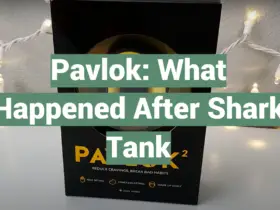
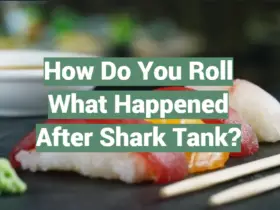
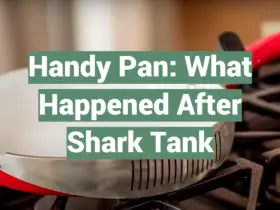
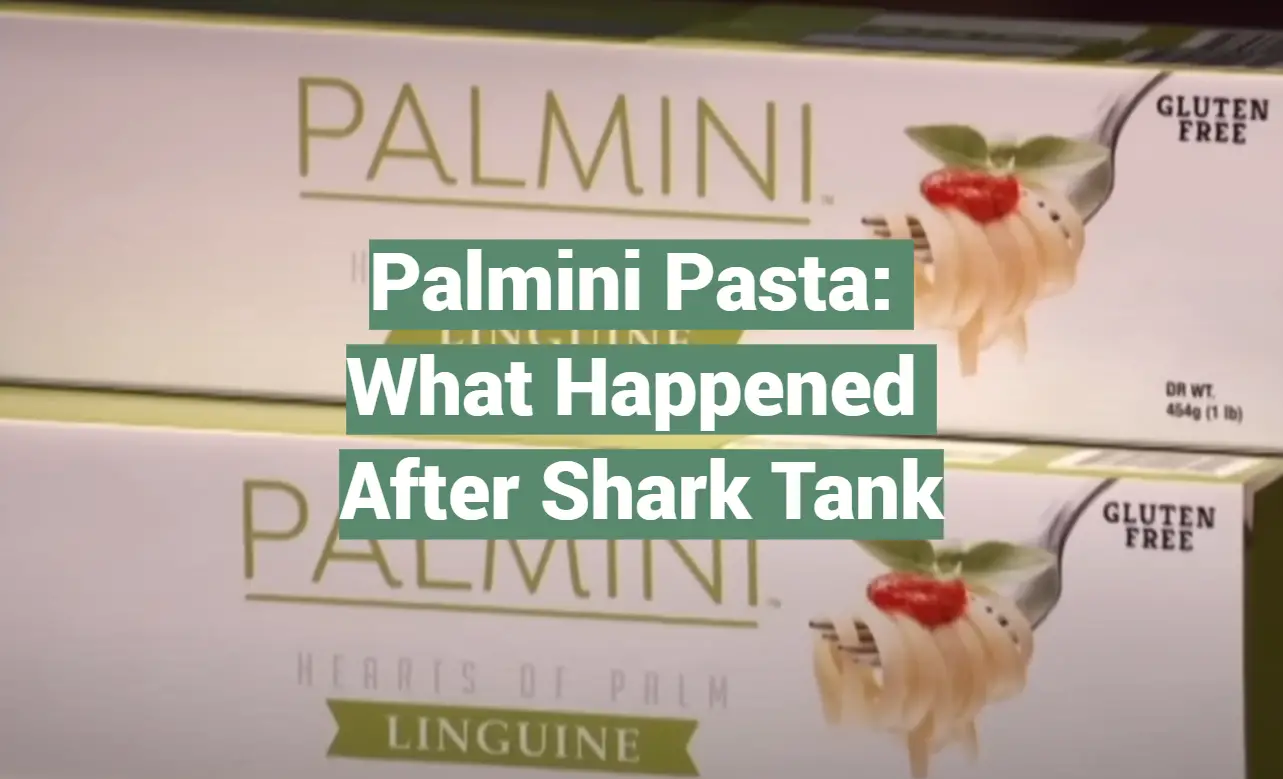





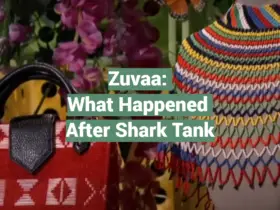
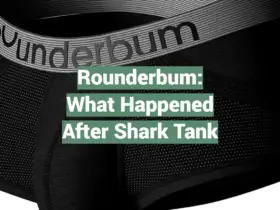

Leave a Reply